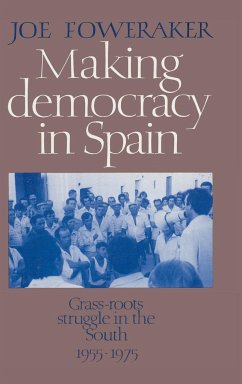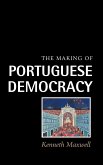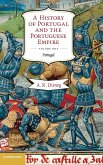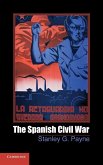Joe Foweraker
Making Democracy in Spain
Joe Foweraker
Making Democracy in Spain
- Gebundenes Buch
- Merkliste
- Auf die Merkliste
- Bewerten Bewerten
- Teilen
- Produkt teilen
- Produkterinnerung
- Produkterinnerung
The story of the unsung heroes whose struggles prepared the transition to democracy in Spain.
Andere Kunden interessierten sich auch für
![The Making of Portuguese Democracy The Making of Portuguese Democracy]() Kenneth MaxwellThe Making of Portuguese Democracy117,99 €
Kenneth MaxwellThe Making of Portuguese Democracy117,99 €![A History of Portugal and the Portuguese Empire, Volume I A History of Portugal and the Portuguese Empire, Volume I]() A. R. DisneyA History of Portugal and the Portuguese Empire, Volume I123,99 €
A. R. DisneyA History of Portugal and the Portuguese Empire, Volume I123,99 €![The Medieval Spains The Medieval Spains]() Bernard F. ReillyThe Medieval Spains136,99 €
Bernard F. ReillyThe Medieval Spains136,99 €![Portuguese Oceanic Expansion, 1400-1800 Portuguese Oceanic Expansion, 1400-1800]() Portuguese Oceanic Expansion, 1400-1800109,99 €
Portuguese Oceanic Expansion, 1400-1800109,99 €![The Spanish Civil War The Spanish Civil War]() Stanley G. PayneThe Spanish Civil War112,99 €
Stanley G. PayneThe Spanish Civil War112,99 €![Philip IV and the Government of Spain, 1621 1665 Philip IV and the Government of Spain, 1621 1665]() R. A. StradlingPhilip IV and the Government of Spain, 1621 166564,99 €
R. A. StradlingPhilip IV and the Government of Spain, 1621 166564,99 €![From Mobilization to Civil War From Mobilization to Civil War]() Pamela B. RadcliffFrom Mobilization to Civil War133,99 €
Pamela B. RadcliffFrom Mobilization to Civil War133,99 €-
-
-
The story of the unsung heroes whose struggles prepared the transition to democracy in Spain.
Hinweis: Dieser Artikel kann nur an eine deutsche Lieferadresse ausgeliefert werden.
Hinweis: Dieser Artikel kann nur an eine deutsche Lieferadresse ausgeliefert werden.
Produktdetails
- Produktdetails
- Verlag: Cambridge University Press
- Seitenzahl: 302
- Erscheinungstermin: 23. März 2015
- Englisch
- Abmessung: 235mm x 157mm x 22mm
- Gewicht: 644g
- ISBN-13: 9780521354066
- ISBN-10: 0521354064
- Artikelnr.: 21143558
- Herstellerkennzeichnung
- Produktsicherheitsverantwortliche/r
- Europaallee 1
- 36244 Bad Hersfeld
- gpsr@libri.de
- Verlag: Cambridge University Press
- Seitenzahl: 302
- Erscheinungstermin: 23. März 2015
- Englisch
- Abmessung: 235mm x 157mm x 22mm
- Gewicht: 644g
- ISBN-13: 9780521354066
- ISBN-10: 0521354064
- Artikelnr.: 21143558
- Herstellerkennzeichnung
- Produktsicherheitsverantwortliche/r
- Europaallee 1
- 36244 Bad Hersfeld
- gpsr@libri.de
Preface; Introduction: personal networks, political strategies and the
making of democracy; Part I. Personal Networks, Political Traditions and
State Policies: 1. Unquiet hearts: the primitive world of the first
political men; 2. The burden of hopes and hatreds: ideological traditions
in clandestine circumstance; 3. Oligarchic unity and working-class
divisions: a political economy of El Marco de Jerez; 4. Political clans and
capitalist planning: a political economy of Francoism; Part II. Syndical
Practices, Social Struggles and Political Protests: 5. The vertical
syndicate: the mainstay of Franco's corporatist strategy; 6. The workers'
commissions: the national picture compared with the movement in El Marco de
Jerez; 7. Wage contracts, labour conflicts and political protests: the
syndical practices of the labour movement; Part III. Political Practices,
Repression and Strategic Responses: 8. The revolutionary paradox: the
changing political line of the Spanish Communist Party; 9. A place in the
struggle: personal networks and political practices in El Marco de Jerez;
10. The other side of darkness: the repressive practices of the Franco
regime; 11. Contingent connections: the relationship between the workers'
commissions and the Spanish Communist Party; 12. Fighting with two faces:
the strategic combination of legal and clandestine spaces; Part IV.
Political Strategies and the Democratic Project: 13. Democratic
transformation and the transition to democracy: the political project of
the labour movement, 1955-85; 14. Corporatist strategies and the transition
to democracy: the institutional terrain of the struggle; 15. Personal
networks and political strategies: Spanish civil society in the struggle
for democracy; Bibliography; Index.
making of democracy; Part I. Personal Networks, Political Traditions and
State Policies: 1. Unquiet hearts: the primitive world of the first
political men; 2. The burden of hopes and hatreds: ideological traditions
in clandestine circumstance; 3. Oligarchic unity and working-class
divisions: a political economy of El Marco de Jerez; 4. Political clans and
capitalist planning: a political economy of Francoism; Part II. Syndical
Practices, Social Struggles and Political Protests: 5. The vertical
syndicate: the mainstay of Franco's corporatist strategy; 6. The workers'
commissions: the national picture compared with the movement in El Marco de
Jerez; 7. Wage contracts, labour conflicts and political protests: the
syndical practices of the labour movement; Part III. Political Practices,
Repression and Strategic Responses: 8. The revolutionary paradox: the
changing political line of the Spanish Communist Party; 9. A place in the
struggle: personal networks and political practices in El Marco de Jerez;
10. The other side of darkness: the repressive practices of the Franco
regime; 11. Contingent connections: the relationship between the workers'
commissions and the Spanish Communist Party; 12. Fighting with two faces:
the strategic combination of legal and clandestine spaces; Part IV.
Political Strategies and the Democratic Project: 13. Democratic
transformation and the transition to democracy: the political project of
the labour movement, 1955-85; 14. Corporatist strategies and the transition
to democracy: the institutional terrain of the struggle; 15. Personal
networks and political strategies: Spanish civil society in the struggle
for democracy; Bibliography; Index.
Preface; Introduction: personal networks, political strategies and the
making of democracy; Part I. Personal Networks, Political Traditions and
State Policies: 1. Unquiet hearts: the primitive world of the first
political men; 2. The burden of hopes and hatreds: ideological traditions
in clandestine circumstance; 3. Oligarchic unity and working-class
divisions: a political economy of El Marco de Jerez; 4. Political clans and
capitalist planning: a political economy of Francoism; Part II. Syndical
Practices, Social Struggles and Political Protests: 5. The vertical
syndicate: the mainstay of Franco's corporatist strategy; 6. The workers'
commissions: the national picture compared with the movement in El Marco de
Jerez; 7. Wage contracts, labour conflicts and political protests: the
syndical practices of the labour movement; Part III. Political Practices,
Repression and Strategic Responses: 8. The revolutionary paradox: the
changing political line of the Spanish Communist Party; 9. A place in the
struggle: personal networks and political practices in El Marco de Jerez;
10. The other side of darkness: the repressive practices of the Franco
regime; 11. Contingent connections: the relationship between the workers'
commissions and the Spanish Communist Party; 12. Fighting with two faces:
the strategic combination of legal and clandestine spaces; Part IV.
Political Strategies and the Democratic Project: 13. Democratic
transformation and the transition to democracy: the political project of
the labour movement, 1955-85; 14. Corporatist strategies and the transition
to democracy: the institutional terrain of the struggle; 15. Personal
networks and political strategies: Spanish civil society in the struggle
for democracy; Bibliography; Index.
making of democracy; Part I. Personal Networks, Political Traditions and
State Policies: 1. Unquiet hearts: the primitive world of the first
political men; 2. The burden of hopes and hatreds: ideological traditions
in clandestine circumstance; 3. Oligarchic unity and working-class
divisions: a political economy of El Marco de Jerez; 4. Political clans and
capitalist planning: a political economy of Francoism; Part II. Syndical
Practices, Social Struggles and Political Protests: 5. The vertical
syndicate: the mainstay of Franco's corporatist strategy; 6. The workers'
commissions: the national picture compared with the movement in El Marco de
Jerez; 7. Wage contracts, labour conflicts and political protests: the
syndical practices of the labour movement; Part III. Political Practices,
Repression and Strategic Responses: 8. The revolutionary paradox: the
changing political line of the Spanish Communist Party; 9. A place in the
struggle: personal networks and political practices in El Marco de Jerez;
10. The other side of darkness: the repressive practices of the Franco
regime; 11. Contingent connections: the relationship between the workers'
commissions and the Spanish Communist Party; 12. Fighting with two faces:
the strategic combination of legal and clandestine spaces; Part IV.
Political Strategies and the Democratic Project: 13. Democratic
transformation and the transition to democracy: the political project of
the labour movement, 1955-85; 14. Corporatist strategies and the transition
to democracy: the institutional terrain of the struggle; 15. Personal
networks and political strategies: Spanish civil society in the struggle
for democracy; Bibliography; Index.








